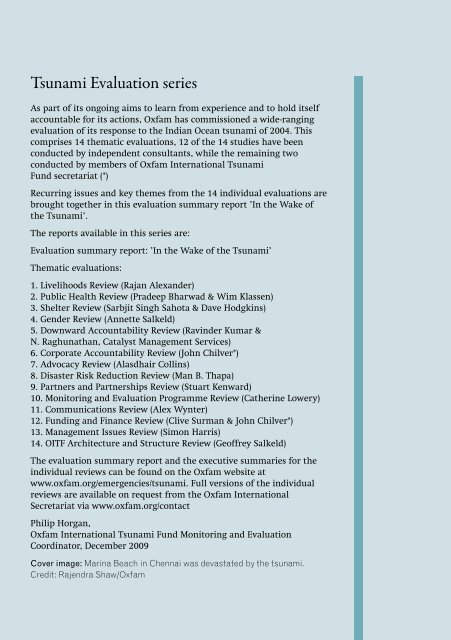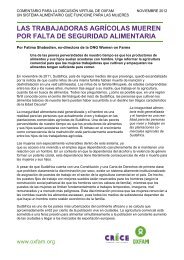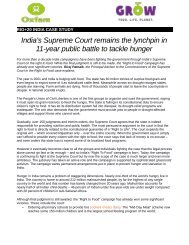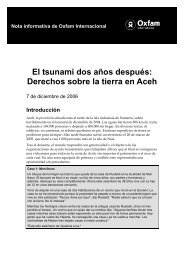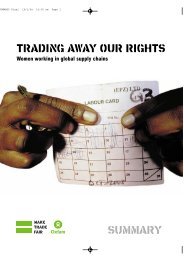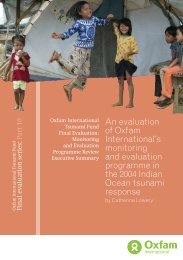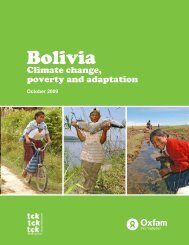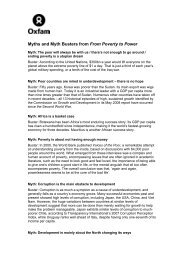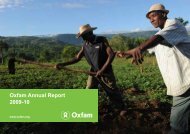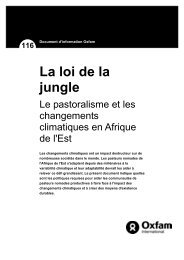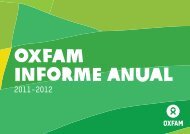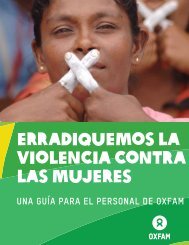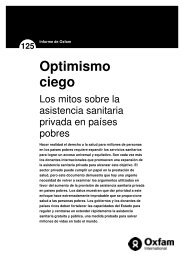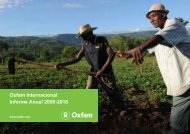Evaluation of disaster risk reduction - Oxfam International
Evaluation of disaster risk reduction - Oxfam International
Evaluation of disaster risk reduction - Oxfam International
You also want an ePaper? Increase the reach of your titles
YUMPU automatically turns print PDFs into web optimized ePapers that Google loves.
Tsunami <strong>Evaluation</strong> series<br />
As part <strong>of</strong> its ongoing aims to learn from experience and to hold itself<br />
accountable for its actions, <strong>Oxfam</strong> has commissioned a wide-ranging<br />
evaluation <strong>of</strong> its response to the Indian Ocean tsunami <strong>of</strong> 2004. This<br />
comprises 14 thematic evaluations, 12 <strong>of</strong> the 14 studies have been<br />
conducted by independent consultants, while the remaining two<br />
conducted by members <strong>of</strong> <strong>Oxfam</strong> <strong>International</strong> Tsunami<br />
Fund secretariat (*)<br />
Recurring issues and key themes from the 14 individual evaluations are<br />
brought together in this evaluation summary report ’In the Wake <strong>of</strong><br />
the Tsunami’.<br />
The reports available in this series are:<br />
<strong>Evaluation</strong> summary report: ’In the Wake <strong>of</strong> the Tsunami’<br />
Thematic evaluations:<br />
1. Livelihoods Review (Rajan Alexander)<br />
2. Public Health Review (Pradeep Bharwad & Wim Klassen)<br />
3. Shelter Review (Sarbjit Singh Sahota & Dave Hodgkins)<br />
4. Gender Review (Annette Salkeld)<br />
5. Downward Accountability Review (Ravinder Kumar &<br />
N. Raghunathan, Catalyst Management Services)<br />
6. Corporate Accountability Review (John Chilver*)<br />
7. Advocacy Review (Alasdhair Collins)<br />
8. Disaster Risk Reduction Review (Man B. Thapa)<br />
9. Partners and Partnerships Review (Stuart Kenward)<br />
10. Monitoring and <strong>Evaluation</strong> Programme Review (Catherine Lowery)<br />
11. Communications Review (Alex Wynter)<br />
12. Funding and Finance Review (Clive Surman & John Chilver*)<br />
13. Management Issues Review (Simon Harris)<br />
14. OITF Architecture and Structure Review (Ge<strong>of</strong>frey Salkeld)<br />
The evaluation summary report and the executive summaries for the<br />
individual reviews can be found on the <strong>Oxfam</strong> website at<br />
www.oxfam.org/emergencies/tsunami. Full versions <strong>of</strong> the individual<br />
reviews are available on request from the <strong>Oxfam</strong> <strong>International</strong><br />
Secretariat via www.oxfam.org/contact<br />
Philip Horgan,<br />
<strong>Oxfam</strong> <strong>International</strong> Tsunami Fund Monitoring and <strong>Evaluation</strong><br />
Coordinator, December 2009<br />
Cover image: Marina Beach in Chennai was devastated by the tsunami.<br />
Credit: Rajendra Shaw/<strong>Oxfam</strong><br />
Cover note<br />
This report is one <strong>of</strong> a number <strong>of</strong> studies that make up the final<br />
evaluation <strong>of</strong> the <strong>Oxfam</strong> <strong>International</strong> Tsunami Fund’s tsunami<br />
response. <strong>Oxfam</strong> <strong>International</strong> has some concerns over the depth<br />
and breadth <strong>of</strong> the analysis in this report, and feels that the<br />
consultant may not have represented all <strong>of</strong> <strong>Oxfam</strong>’s DRR-related<br />
tsunami work due to a variety <strong>of</strong> reasons, including limited access<br />
to relevant information. This report is being published as part <strong>of</strong><br />
the series <strong>of</strong> evaluation studies, for the sake <strong>of</strong> transparency and<br />
respecting the independence <strong>of</strong> the consultant, and will be followed<br />
up in 2009 and 2010 with additional analysis by an internal <strong>Oxfam</strong><br />
DRR network.<br />
Philip Horgan, December 2009<br />
Background<br />
The Indian Ocean tsunami <strong>of</strong> December 2004 was one <strong>of</strong> the world’s<br />
worst natural <strong>disaster</strong>s, with a confirmed death toll <strong>of</strong> almost<br />
300,000. Nearly 90 per cent <strong>of</strong> deaths were in Indonesia, with Aceh<br />
province bearing the brunt <strong>of</strong> the <strong>disaster</strong>.<br />
The response <strong>of</strong> the world community was overwhelming, with<br />
huge amounts <strong>of</strong> time, resources, and logistics being donated to<br />
rescue survivors, provide food, water, and health services, clear<br />
debris, and undertake rehabilitation and reconstruction work<br />
to restore the livelihoods <strong>of</strong> the affected population. More than<br />
US$2bn worth <strong>of</strong> support was rapidly mobilised from around 40<br />
countries. About one million people in Indonesia and 700,000<br />
elsewhere had to be fed and supported over a period <strong>of</strong> many<br />
months. Providing fresh water was a priority task, as sources had<br />
been contaminated by seawater and rendered undrinkable.<br />
The <strong>Oxfam</strong> <strong>International</strong> Tsunami Fund (OITF) response was the<br />
largest single humanitarian response in <strong>Oxfam</strong>’s history, with<br />
programmes in Indonesia, Sri Lanka, India, Burma, Thailand,<br />
Somalia, and the Maldives, designed and implemented by a<br />
number <strong>of</strong> different <strong>Oxfam</strong> affiliates and with a budget totalling<br />
close to US$300m.<br />
1


